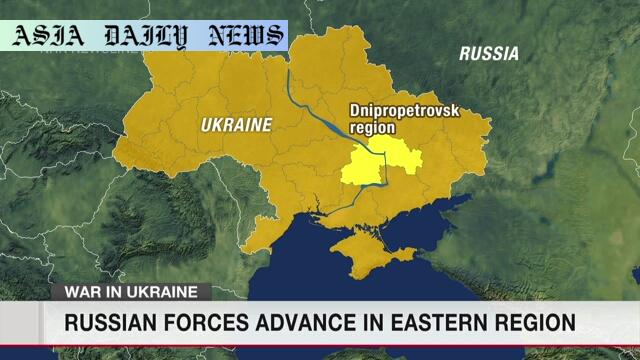Dnipropetrovsk sees a new chapter in the ongoing conflict as Russia launches its first offensive in the region amid sustained attacks elsewhere in Ukraine.

Russia’s Offensive in Dnipropetrovsk: A Turning Point
Russia has initiated a noteworthy escalation in its offensive operations by targeting the Dnipropetrovsk region in eastern Ukraine. As announced by the Russian defense ministry, a tank division has advanced to the western border of Donetsk and is intensifying its push into Dnipropetrovsk. This marks the first time since the inception of Russia’s large-scale invasion of Ukraine that it has extended military efforts into this region. Such actions signify a strategic shift, further exacerbating the conflict’s intensity and geographical scope.
The move into Dnipropetrovsk comes amidst a series of high-impact attacks on other parts of Ukraine. Over the weekend, Kharkiv, Ukraine’s second-largest city, was struck with missiles, drones, and guided bombs, leaving at least five people dead. The violence in Kharkiv has been described by its mayor as the most powerful attack yet. The repeated targeting of civilian centers raises grave humanitarian concerns, signaling a dangerous phase in the conflict.
Russian Retaliation and Broader Implications
Russia’s recent aggression in Ukraine may be a direct retaliation for the June 1 Ukrainian drone strikes on Russian airbases. The Kremlin is believed to be preparing more extensive reprisals, which could include various air-based attacks such as missiles and drones. US sources have indicated that the full response is anticipated within days, with military experts expecting a multi-pronged strategy aimed at undermining Ukraine’s resilience.
Amid these developments, the international community continues to monitor the situation closely. Western nations, particularly the United States, have expressed concerns regarding Moscow’s increasing belligerence. The prospect of sustained violence intensifies geopolitical tensions, further straining East-West relations and complicating diplomatic efforts to resolve the crisis.
Wider Impact of the Escalation
The broader implications of Russia’s advance into Dnipropetrovsk are substantial. Ukraine’s eastern regions are already reeling under the weight of nearly three years of conflict, and these new offensive operations will likely displace more civilians and exhaust already strained resources. Simultaneously, Moscow’s aggression underscores its focus on consolidating control over key territories near the Donetsk region, indicating a long-term strategic goal of territorial dominance.
As the situation evolves, humanitarian concerns are at the forefront. The mounting casualties in Kharkiv and the region-wide impact on civilians highlight the pressing need for immediate international intervention. Continued hostilities foster an atmosphere where peace talks and negotiations face significant hurdles, pushing Ukraine and Russia further away from a diplomatic resolution.
Looking Ahead: A Conflict with Global Implications
The offensive in Dnipropetrovsk exemplifies the protracted nature of the Ukrainian conflict. While localized in Eastern Europe, the repercussions are global, influencing energy markets, international diplomacy, and security policies. The international community’s response will be critical in shaping the conflict’s trajectory and determining the extent of Russia’s ambitions in the region.
Appeals for negotiations and diplomatic efforts remain essential. However, as both Russia and Ukraine remain entrenched in their positions, finding an amicable resolution grows increasingly complex. For Ukraine, the steadfast support of its Western allies is vital in countering Russian advances and rebuilding its occupied territories. For Russia, sustaining these military operations entails significant economic and political risks, both domestically and internationally.
Commentary
Russia’s Advance Raises Questions on Intentions
Russia’s offensive into Dnipropetrovsk represents a notable shift in the ongoing conflict. The region, previously untouched in this war, now becomes a focal point in Russia’s military strategy. This expansion raises crucial questions about Moscow’s long-term intentions. Is this new push designed to pressure Ukraine into concessions, or does it reflect a broader territorial ambition? These are not just theoretical inquiries but ones that hold real significance for the global community.
Escalating Humanitarian Crisis
The human cost of the conflict continues to climb. The devastating attacks on civilian centers like Kharkiv underscore the indiscriminate nature of modern warfare, where innocents invariably bear the brunt of aggression. With five lives lost in Kharkiv alone and countless individuals displaced, the humanitarian situation in Ukraine is becoming increasingly dire. The international community must bolster its support for organizations providing aid and relief to those affected, ensuring basic needs are met amid the chaos.
Global Implications of the Escalation
Russia’s actions have not only intensified the regional conflict but also added fuel to global tensions. Western nations, particularly those in NATO, find themselves grappling with the question of how to respond effectively without further provoking Moscow. Economic sanctions and military aid to Ukraine have so far been their primary tools, but the evolving situation may demand a reevaluation of strategy. Additionally, this conflict could shape the global energy landscape, as Ukraine’s instability threatens supply lines and market stability.
A Call for Renewed Diplomacy
While the prospects for diplomacy seem dim, they remain immensely important. The conflict’s resolution rests on finding a path that satisfies the minimal demands of both sides while preventing further escalation. Stakeholders across the globe must rally to facilitate dialogue and de-escalate tensions. This is not just about Ukraine or Russia—it is about maintaining international norms and preventing a broader, more catastrophic conflict.


